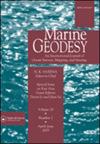北印度洋卫星地面观测的次表层海洋结构
IF 1.4
4区 地球科学
Q2 GEOCHEMISTRY & GEOPHYSICS
引用次数: 1
摘要
摘要本研究采用内加表面准地营养(isQG)方法,利用海面温度(SST)、海面盐度(SSS)和海面高度(SSH)重建地下密度异常。这项研究是在阿拉伯海和北印度洋地区的孟加拉湾进行的。isQG首先在同卵双胞胎实验中进行了测试,其中表面数据和稳定性剖面(N2)取自海洋数值模型。isQG与模型密度异常之间的均方根误差(RMSE)在大多数水平上都位于模型密度异常的误差条内。研究了SST和SSS综合观测的预期误差对isQG反演密度异常的影响,发现SSS的误差导致阿拉伯海isQG密度异常剖面的RMSE大于孟加拉湾。然后将isQG方法应用于SST、SSS和SSH的卫星观测,并将检索到的密度剖面与2019年RAMA浮标的模型输出和现场观测结果进行比较。比较表明N2对isQG方法性能的季节依赖性和影响。本文章由计算机程序翻译,如有差异,请以英文原文为准。
Sub-Surface Ocean Structure from Satellite Surface Observations in the North Indian Ocean
Abstract In this study interior plus Surface Quasi-Geostrophic (isQG) methodology is used to reconstruct subsurface density anomaly using sea surface temperature (SST), sea surface salinity (SSS) and sea surface height (SSH). The study is carried out in the Arabian Sea and Bay of Bengal of the Northern Indian ocean region. isQG is first tested for identical twin experiments, where the surface data and the stability profile (N2) were taken from a numerical ocean model. The root mean square error (RMSE) between isQG and model density anomalies lie within the error bars of model density anomaly in most of the levels. The impact of expected errors in synthetic observations of SST and SSS on isQG retrieved density anomalies was studied and it is found that error in SSS results in greater RMSE in isQG density anomaly profile in the Arabian sea than in the Bay of Bengal. isQG method is then applied to the satellite observations of SST, SSS and SSH and retrieved density profiles are then compared with model outputs and in-situ observations from RAMA buoy for the year 2019. The comparison indicates seasonal dependency and effect of N2 on the performance of isQG method.
求助全文
通过发布文献求助,成功后即可免费获取论文全文。
去求助
来源期刊

Marine Geodesy
地学-地球化学与地球物理
CiteScore
4.10
自引率
6.20%
发文量
27
审稿时长
>12 weeks
期刊介绍:
The aim of Marine Geodesy is to stimulate progress in ocean surveys, mapping, and remote sensing by promoting problem-oriented research in the marine and coastal environment.
The journal will consider articles on the following topics:
topography and mapping;
satellite altimetry;
bathymetry;
positioning;
precise navigation;
boundary demarcation and determination;
tsunamis;
plate/tectonics;
geoid determination;
hydrographic and oceanographic observations;
acoustics and space instrumentation;
ground truth;
system calibration and validation;
geographic information systems.
 求助内容:
求助内容: 应助结果提醒方式:
应助结果提醒方式:


